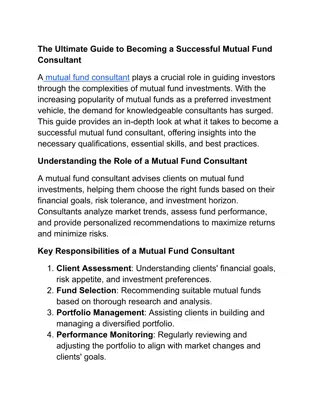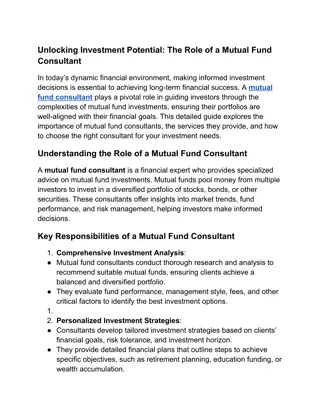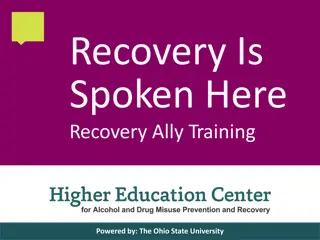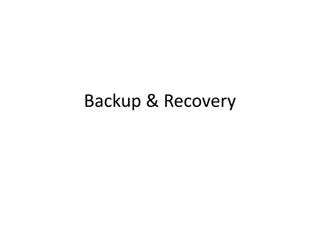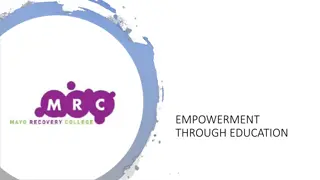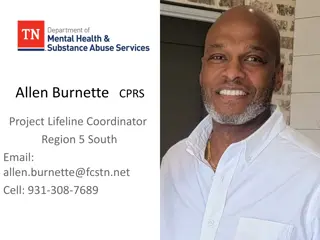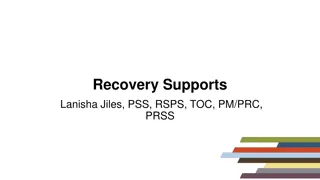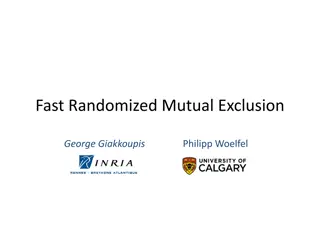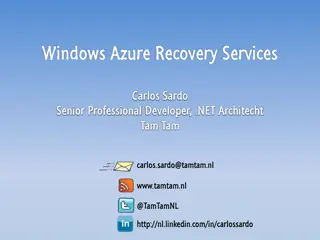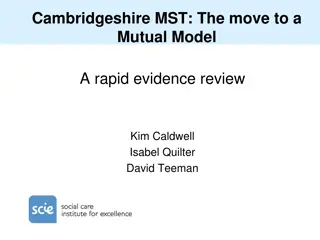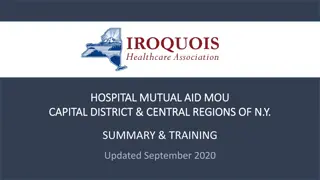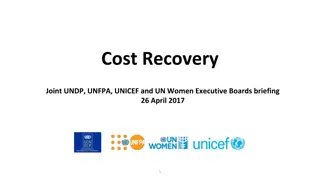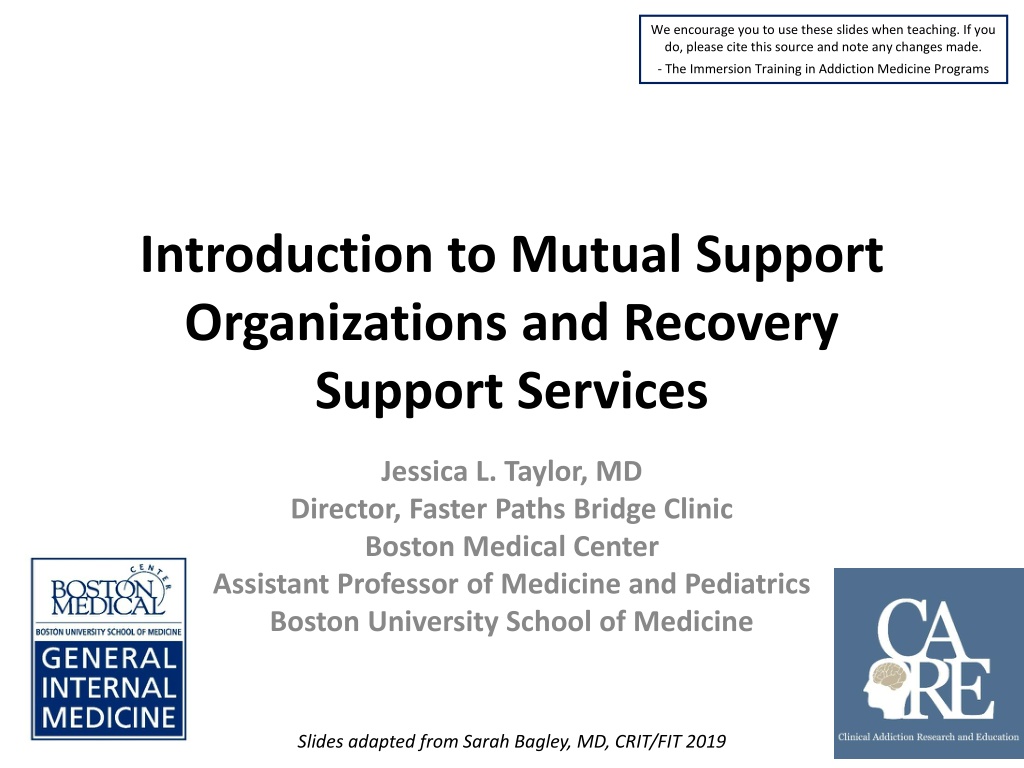
Understanding Mutual Support Organizations in Addiction Recovery Programs
Explore the value of mutual support organizations, such as Alcoholics Anonymous, in addiction recovery programs. Learn about different types of meetings, guidelines for attendees, and the therapeutic elements offered. Discover the importance of individualized treatment options and the supportive environment created by these organizations.
Download Presentation

Please find below an Image/Link to download the presentation.
The content on the website is provided AS IS for your information and personal use only. It may not be sold, licensed, or shared on other websites without obtaining consent from the author. Download presentation by click this link. If you encounter any issues during the download, it is possible that the publisher has removed the file from their server.
E N D
Presentation Transcript
We encourage you to use these slides when teaching. If you do, please cite this source and note any changes made. - The Immersion Training in Addiction Medicine Programs Introduction to Mutual Support Organizations and Recovery Support Services Jessica L. Taylor, MD Director, Faster Paths Bridge Clinic Boston Medical Center Assistant Professor of Medicine and Pediatrics Boston University School of Medicine Slides adapted from Sarah Bagley, MD, CRIT/FIT 2019
Learning Objectives At the end of the session, learners will be able to: 1. Explain the value of offering mutual support organizations as part of a menu of options 2. Understand the differences between the various types of 12-step meetings 3. List at least 4 guidelines for visitors attending a meeting of a mutual support organization
What is Recovery? SAMHSA, 2012
I have attended an Alcoholics Anonymous or Narcotics Anonymous meeting in the past. 1. Never 2. Once 3. 2-5 times 4. 6-10 times 5. 11-25 times 6. 26+ times
Offering Mutual Support Organizations as Part of Menu of Options Addiction treatment should be individualized Not possible to predict which combination of treatment will be effective on patient level MSOs are the umbrella term referring to when >2 people meet and provide support to each other and are not formal treatment
What is Alcoholics Anonymous? Anonymous fellowship of members with a desire to stop drinking Founded in 1939 by Bill W. and Dr. Bob: reaching out to others to help stay sober No central governing body Similar groups: Narcotics Anonymous, Overeaters Anonymous, and Al-Anon
Therapeutic Elements 12 Steps: spiritual basis/necessary actions (principles) 12 Traditions: guidelines for meetings Sponsorship Sober environment of meetings Forum for telling story with no judgment Anniversaries Slogans Potential for social network outside of meetings
Process Admitting lack over control over addiction Recognition that higher power can give strength to achieve sobriety Examining past mistakes Making amends Learning to live new life with new code Helping others
Kinds of Meetings Open, closed Mixed, men-only, women-only, young peoples Speakers, Big Book, Step Study, Discussion Smoking, non-smoking
Research has shown that: 1. AA attendance can reduce health care costs 2. Longer and more intensive AA involvement leads to better outcomes 3. Mechanism of effectiveness varies by gender, age and addiction severity 4. All of the above
Effectiveness of AA Challenging to study- usually prospective, longitudinal studies occurring in treatment settings Healthcare professionals can impact level of affiliation (Humphreys et al, 2004) Cost-effective: attendance at MHG may lead to increased cost savings because of lower treatment costs (Kelly et al, 2009)
Mechanisms of Effectiveness Self-efficacy, increased coping skills, maintain motivation for recovery over time, and adaptive changes in social networks (Kelly et al, 2009) Increased spirituality shown to also have benefit especially for people with severe disease (Kelly, 2016) Individuals benefit in different ways based on gender, age, and addiction severity (Kelly, 2016)
I have referred a patient to Alcoholics Anonymous or Narcotics Anonymous. 1. Never 2. Once 3. 2-5 times 4. 6-10 times 5. 11-25 times 6. 26+ times
Referring a Patient Provide access to list of local meetings, download app to find local meetings (for NA) Encourage attending with a friend/family member and trying multiple meetings Help choose among different types and locations of meetings (speaker, discussion, beginners ) Talk about possible conflicts Religion Medications Powerlessness
Role of Provider Individuals who have sponsors and work the steps tend to do better in their recovery. Important to ask patients if they have a sponsor and if they are working the steps. Possible to find a temporary sponsor in the beginning if not ready to commit.
My primary concern about referring patients to Alcoholics Anonymous and Narcotics Anonymous is: 1. I don t know much about the programs 2. The programs are too religious 3. The programs emphasize that members are powerless 4. I am not concerned about referring patients
Similar Mutual Support Groups Narcotics Anonymous Al-Anon Alateen Crystal Meth Anonymous
Attending a Meeting Contact: look up local AA website, call central service for more information Attend only open meetings Be honest and direct, introduce yourself to greeter if at door
Attending a meeting Respect confidentiality Feel free to join in prayer or closing ceremony Give a few dollars if you feel comfortable No note taking
Suggested script Hi, my name is X. We are group of physicians who are taking a course to learn about addiction so we can do a better job taking care of our patients. We understand that since this is an open meeting, it s ok for us to attend. We really appreciate the chance to be here.
Attending a Virtual Meeting Log in a few minutes early to introduce self to facilitator if possible When called on, share name and role as physician observer Follow Zoom etiquette for meeting Be on video, attentive if others are on video Go off video if asked by facilitator
Learning Objectives At the end of the session, learners will be able to: 1. Explain the value of offering mutual support organizations as part of a menu of options . 2. Understand the differences between the various types of 12-step meetings. 3. List at least 4 guidelines for visitors attending a meeting of a mutual support organization.
Recovery Support Services Recovery Support Services delivered by peers through formal structures, special roles, in various and settings (coaches, centers, schools, drop-in centers) Some states beginning to standardize training MA DPH 5-day Recovery Coach Academy Certified Addiction Recovery Coach credentialing BSAS Recovery Coach Trainings. https://careersofsubstance.org/resources/training-search/bsas-recovery-coach-trainings. Accessed 10/12/20.
Evidence for Peer Recovery Support Services Recent systematic review identified 9 studies and found that overall, peer support appears to have positive effect on substance use outcomes1 Limited, weak data varying definitions of peer support, lack of RCTs and comparison groups Recent RCT found that inpatient linkage to peer recovery coaching improved engagement at 6 months (84% vs 34%), but not substance use frequnecy2 More evidence needed to determine training, dose, context and effectiveness among target populations 1. Bassuk EL et al. JSAT 2016; 63:1-9 2. Byrne KA et al. DAD 2020; 215: epub 2020 Aug 23.





